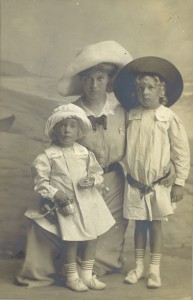My great-grandmother Sara Theodora Ilsley (1881–1945) was an orphan from the age of fourteen, so it is not surprising that her descendants did not know much about her family. My father, who knew his grandmother well, told me that “Grandma came from Newburyport,” which isn’t really the case: She was an Ilsley descended from the immigrant to Newbury, it’s true, but her branch had gone north to Falmouth/Portland and then south to Newark.
Furthermore, my great-grandmother’s Beekman ancestry has tended to obscure the (to me) equally interesting fact that Theodora Ilsley belonged to a distinguished family of musicians, among them her father Francis Grenville Ilsley (1831–1887), grandfather Francis Lunt Ilsley (1804–1874), and great-grandfather Nathaniel Ilsley (1781–1870).
Archive.org offers a searchable copy of George Thornton Edwards’ Music and Musicians of Maine (1928), which has pages of references to the Ilsley family. Portland had a vibrant music scene as early as the late 1810s, when the Beethoven Musical Society began its performances. Among the early members were Nathaniel Ilsley (tenor) and his sons Francis L. Ilsley (tenor) and Ferdinand Ingersoll Ilsley (1808–1890), an alto and then tenor. (Francis and Ferdinand were half-brothers, and their mothers were sisters: Elizabeth Lunt, who died in 1804, and Judith Lunt, who died in 1854.) Uncle Ferdinand went on to found the Portland Academy of Music (1835), and in 1836 Francis and Ferdinand were incorporators of the Portland Sacred Music Society (1836–54). The following year their younger siblings Arthur Lewis Ilsley (1812–1893) and Esther Davis Ilsley (1819–1879) sang – with the Sacred Music Society – the principal roles in the first performance of Hayden’s Creation oratorio ever performed in Maine.
Edwards quotes Samuel Thurston on the local prominence of the Ilsley family in the 1830s and 1840s: “Ferdinand whose wife’s name was Isabella (though they were not Spanish) was a superior violinist as well as a tenor singer… Arthur was a solo singer in the Sacred Music Society and conductor also a portion of the time… Frank (or Francis) was a fine tenor singer in church and oratorio. [In 1835, he was also president of the Cumberland Musical Association.] George [George Frederick Ilsley (1823–1897)] had an exceptionally fine tenor voice and was a very popular singer in this locality when a young man, but he had an attack of Western fever which was very prevalent here about that time and which took many people off. Miss Elizabeth [Elizabeth Lunt Ilsley (1816–1900), later Mrs. Aaron Colton Merrick] was one of the most prominent, and I may say the most prominent, church and oratorio soprano in Portland for several years. Esther, who became Mrs. Branscomb, was one of the same sort, only a little less prominent than her next older sister [i.e., Elizabeth]. Ann [Ann Matilda Ilsley (1827–1895), later Mrs. Austin Summerton Hart] was in the same category only a little less prominent than her next older sister [i.e., Esther]. A singular point in this case is that so far as I know, the parents were not particularly musical [sic]. I knew them several years but never heard of either as singing or playing an instrument.” (p. 77)
Within a few years, members of the family settled in Chelsea, Massachusetts, and Buffalo, New York, but by 1840 the musical focus of my branch of the family had moved to Troy, New York, and then to Newark, New Jersey, by 1850.
The series continues here.
Share this:
About Scott C. Steward
Scott C. Steward has been NEHGS’ Editor-in-Chief since 2013. He is the author, co-author, or editor of genealogies of the Ayer, Le Roy, Lowell, Saltonstall, Thorndike, and Winthrop families. His articles have appeared in The New England Historical and Genealogical Register, NEXUS, New England Ancestors, American Ancestors, and The Pennsylvania Genealogical Magazine, and he has written book reviews for the Register, The New York Genealogical and Biographical Record, and the National Genealogical Society Quarterly.View all posts by Scott C. Steward →
